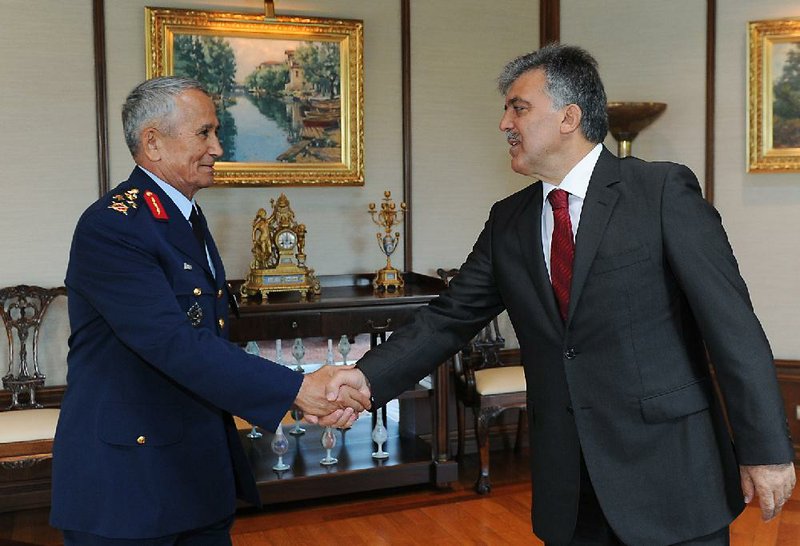ANKARA, Turkey — Syrian forces opened fire on a Turkish rescue aircraft as it searched for crewmen missing after a warplane was downed in the Mediterranean, prompting a warning from the Turkish military, the country’s deputy prime minister said Monday.
Speaking on the eve of a North Atlantic Treaty Organization meeting on the jet’s downing, Bulent Arinc said after a Cabinet meeting in Ankara that Syria’s actions Friday were “hostile” and carried out “in cold blood.”
Turkey also said Monday that it would push NATO to consider Syria’s downing of a Turkish jet as an attack on the whole military alliance.
After the destruction of a Turkish F-4 Phantom aircraft, “another of our planes that joined the first rescue operations also received harassing fire from Syria,” Arinc said. “They stopped when warnings were given,” he said. A Syrian Foreign Ministry account Monday suggesting that the aircraft was hit by anti-aircraft guns rather than a ground-to-air missile was untrue, Arinc said.
Turkey’s new allegations about last week’s events off the coast of Syria further raised tensions ahead of the NATO meeting in Brussels.Relations between the former allies were already strained by Syrian President Bashar Assad’s crackdown on antigovernment protesters, which opposition groups say has left more than 14,000 people dead.
Turkey invoked Articles 4 and 5 of the NATO treaty in seeking the meeting, Arinc said. Article 5 requires members to recognize an attack on one as an attack on all and to assist the violated member in any action it deems necessary, including the use of armed force. The U.S. backed the Turkish account.
“There was no warning to this aircraft. It was just shot out of the sky,” U.S. State Department spokesman Victoria Nuland said Monday. “And that obviously is not in keeping with international norms in such incidents.”
Syria had earlier responded to several Turkish accounts by giving its own version of events. While the destruction of a Turkish F-4 was an “accident,” Syria’s Foreign Ministry spokesman Jihad Makdissi said Monday, it was also a defensive act after a “clear violation of Syrian sovereignty.”
The jet was flying at 435-500 mph at a height of about 300 feet, he said, meaning Syrian air defenses had to respond very quickly. The F-4 was flying in airspace that had previously been violated by Israeli aircraft, Makdissi said.
He said the plane was shot down by an anti-aircraft gun with a range of about 1.5 miles and not with missiles.
“We do not have any hostile intentions against the Turkish people or the Turkish government,” Makdissi said at a news conference in Damascus, the Syrian capital. The two missing Turkish airmen haven’t been found, though aircraft wreckage has been discovered, Makdissi said.
The F-4 was in international airspace when it was struck, Turkish Foreign Minister Ahmed Davutoglu said Sunday, and Turkey was still weighing a response to the attack.
The unarmed plane briefly entered Syrian airspace minutes before it was hit and then plunged into waters about 8 miles off the Syrian coast, Davutoglu said. It was on a test flight related to Turkey’s radar system and was not spying on Syria, he said.
The plane was clearly identifiable as Turkish, and Syria made no attempt to issue a warning after the earlier infringement, Davutoglu said.
Arinc also said Syria was misleading the world when it said its forces could not recognize the plane until after it was downed.
He said the plane’s electronic signals, which indicate if an aircraft is friend or foe, were activated during the entire flight and that Turkey even intercepted radio conversations in which Syrian forces referred to the plane.
Arinc did not elaborate, but Hurriyet newspaper, citing intelligence sources, said Monday that Syrian forces referred to the plane using the Turkish word for “neighbor” - “komsu” -in an intercepted radio conversation.
The day before the Turkish aircraft was destroyed, a Syrian MiG-21 pilot defected to Jordan in his aircraft.
Turkey’s state-run Anadolu news agency reported Monday that 33 Syrian soldiers defected and fled overnight to Turkey, including a second general and two colonels.
A Turkish government official, who spoke on condition of anonymity in line with government rules, said the group included three colonels, and there was no general.
The two accounts could not immediately be reconciled.
Thousands of soldiers have abandoned the Syrian regime, but most are low-level conscripts. The rebel Free Syrian Army - which is based in Turkey - is made up largely of defectors.
Anadolu said Monday that a total of 224 people crossed into Turkey overnight.
The defectors were taken to a refugee camp in Hatay, a province bordering Syria. Turkey is host to 33,000 Syrians who are seeking refuge from the violence.
Syria has criticized Turkey for hosting meetings of Syrian opposition groups, while Turkey has called for a change of regime in its southern neighbor.
Meanwhile, Turkish Energy Minister Taner Yildiz suggested Monday that Turkey will cut electricity supplies to Syria. Turkish companies provide Syria with about 10 percent of Syria’s annual power consumption. Yildiz said a decision on the issue could be announced today.
Turkish Prime Minister Recep Tayyip Erdogan is expected to address legislators in parliament today and reveal what measures Turkey will take against Damascus for downing down the plane.
Also Monday, the Red Cross said hundreds of civilians are trapped in the Syrian city of Homs and aid workers cannot reach them because of the fighting. Homs has been one of the hardest-hit areas in Syria as regime forces try to crush the opposition.
Information for this article was contributed by Ali Berat Meric, Donna Abu-Nasr, Benjamin Harvey and Peter S. Green of Bloomberg News and by Bassem Mroue, Suzan Fraser and Selcan Hacaoglu of The Associated Press.
Front Section, Pages 6 on 06/26/2012

